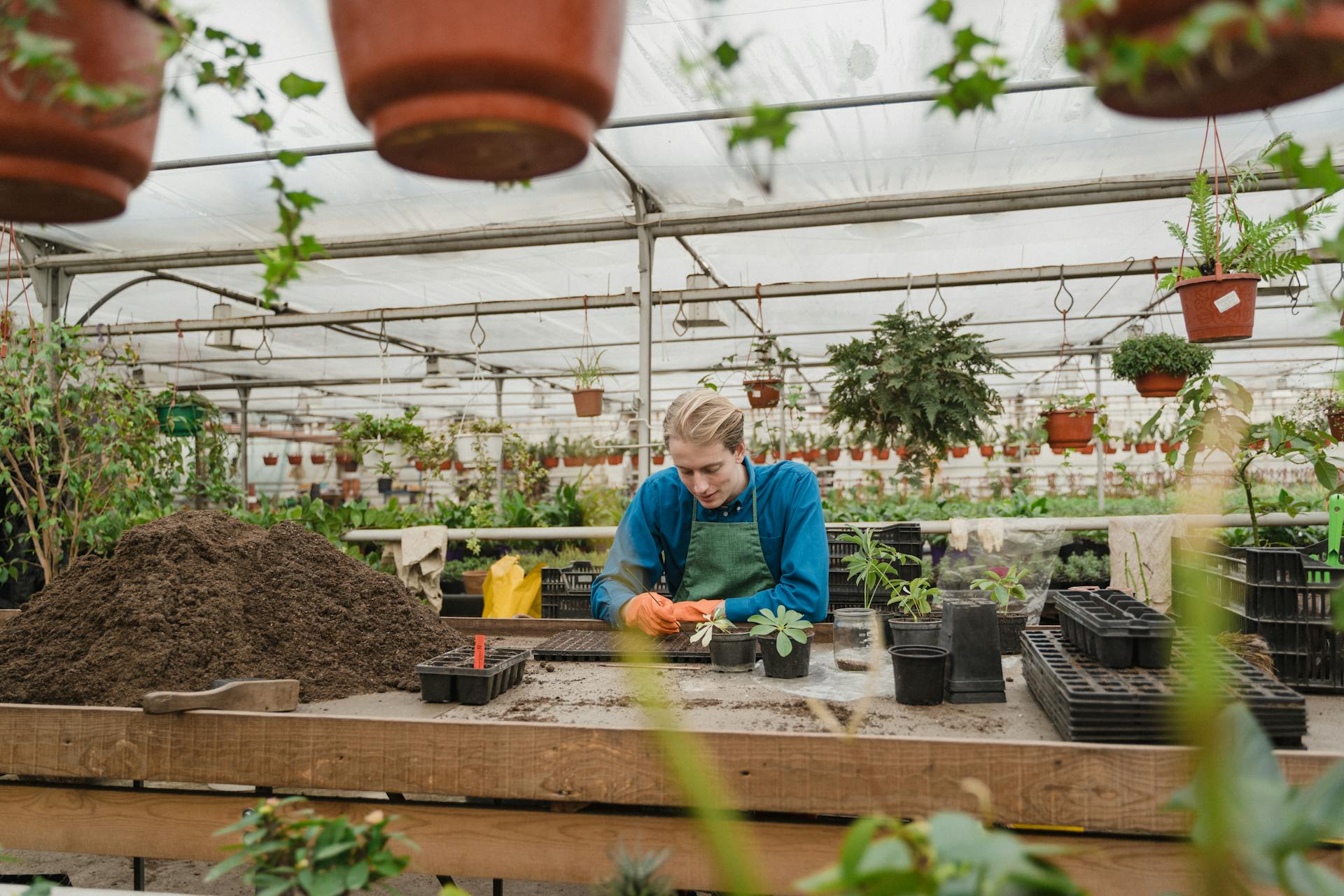
Transform Your Garden with This Ultimate Home Mulch Guide! If you want to make your garden look and feel healthier, then mulching is the way to go. A home mulch guide can help you achieve a beautiful, low-maintenance garden that will thrive for years to come. Whether you are an experienced gardener or just starting out, this guide will provide you with all the information you need to get started.
Mulching is a simple yet effective way to improve the health of your garden. It involves applying a layer of organic material over the soil surface around plants and trees. This layer helps retain moisture in the soil, suppresses weed growth, regulates temperature fluctuations, and improves soil fertility. With the right home mulch guide, you will learn how to choose the best type of mulch for your garden and how to apply it properly for maximum results.
Here's an interesting read: Guide to Greenhouse Gardening
Exploring the many shades and applications of garden mulch
Garden mulch is a great labor saver, providing numerous benefits for your plants and landscape. Whether you're looking to improve soil quality, reduce evaporation, or slow weed growth, there's a mulch out there that can help. From organic materials like grass clippings and leaves to synthetic options like rubber and plastic, garden mulch comes in all shapes and sizes.
Using mulch in your lawn reduces evaporation and slows weed growth while also improving soil quality. Organic mulches break down over time, enriching the soil with nutrients that help your plants thrive. Synthetic mulches can last longer but may not provide the same level of soil enrichment. Regardless of which type you choose, adding a layer of garden mulch to your landscape is an easy way to protect your plants and keep them healthy for years to come.
See what others are reading: Mold on Houseplant Soil
Discover the Natural Beauty of Mini Pine Nugget Bark Mulch
Mini pine bark mulch is a shredded mulch that comes in chunkier pieces compared to other types of mulches. It's a great landscaping option for walk paths, driveways, and gardens. This type of mulch adds curb appeal to any home garden with its neat natural look.
One of the advantages of mini pine bark mulch is that it protects the soil from erosion by reducing water runoff. It also acts as a temperature regulator for plant roots retaining moisture during hot days and insulating them during colder seasons. Moreover, this type of bark mulch breaks down slowly giving your garden long-lasting benefits.
Mini pine nugget bark mulch is an excellent choice for homeowners who want to create an attractive garden without spending too much time on maintenance. It's easy to install and requires little upkeep once it's in place. This versatile landscaping material can be used for many purposes around your yard, including creating borders, suppressing weeds, and adding texture to flower beds. Try mini pine nugget bark mulch today and enjoy its natural beauty!
What's the Right Amount of Organic Mulch to Apply?
Mulching your garden beds is a great way to increase moisture retention, prevent weed seeds from germinating, and keep the soil cool. The right amount of organic mulch to apply depends on the type of plants you have in your garden. For shallow-rooted plants, like annuals and vegetables, a thinner layer of mulch (1-2 inches) is sufficient. For deeper-rooted plants, like shrubs and trees, you can apply a thicker layer (3-4 inches) of shredded type organic mulch.
When you are applying organic mulch 3 inches deep, it'll mat down over time and become compacted if not maintained properly. Pull back the mulch around trees as they grow to avoid suffocating their roots. On slopes, apply a thinner layer to prevent erosion or washout during heavy rains. Note that cocoa bean mulch has a deep brown color and chocolate odor that might attract pets; so it's best to use with caution.
Effectively applying organic mulch can be a bit tricky at first but remember that thicker layers tend to keep moisture better than thin layers. However, too much mulch can create an environment for pests or diseases which is why it's important to monitor and maintain its thickness regularly. With these tips in mind, you'll be able to enjoy the benefits of organic mulching in no time!
Whether you are preventing weeds or beautifying a garden bed, follow this guide to pick the right mulch for your garden.
Choosing the right mulch for your garden is a simple part of maintaining your planting beds. The right mulch can help keep weeds at bay and keep your plants healthy all year long. When it comes to choosing the right mulch, shredded bark is a popular choice for many gardeners. Not only does it provide excellent weed control, but it also adds nutrients to the soil as it breaks down.
If you're new to gardening, knowing which type of mulch to add to your spring garden can be overwhelming. Consider using shredded bark for an easy solution that will benefit your planting beds throughout the entire year. This type of mulch is available in a range of colors and textures, so you can choose one that complements your garden's aesthetic.
Adding mulch to your garden may seem like a small detail, but it can make a big impact on the health and beauty of your plants. By choosing the right mulch for your needs, such as shredded bark for weed control and nutrient-rich soil, you'll be able to ensure that your garden thrives all season long.
Discover which mulch maintains its vibrancy the longest
When it comes to maintaining the vibrancy of your garden, choosing the right mulch is key. According to Family Handyman, natural organic mulches tend to turn gray after a year depending on weather conditions. However, for those who want to keep their flowers looking fresh, buy custom-colored organic mulches or opt for a red dyed mulch pictured that will maintain its color longer. Keep in mind that colored mulches are processed with vegetable dyes and may not have the same colors as you expect.
If you're looking for long-lasting color, red bark mulch is a great option. It typically lasts several years before fading from its original bright colors. However, keep in mind that hard rain can wash away some of the dye and cause color loss over time. For even longer-lasting colors, consider using stone mulches instead of organic ones. Different rock types come in various colors depending on where you live and these colors won't fade over time.
If you want to use colored mulch but are concerned about maintaining its vibrancy, remember that periodic cleaning can help. Lighter-colored rock types require more frequent cleaning while darker ones tend to hide dirt and debris better. If you're unsure which type of colored mulch is best suited for your garden needs, visit your local nursery and ask for recommendations based on your location's climate and soil composition.
Frequently Asked Questions
What type of mulch lasts the longest?
"Hardwood mulch tends to last the longest due to its slow decomposition rate and ability to retain moisture. It can provide up to 2-3 years of coverage before needing to be replenished."
Is Mulch good for the environment?
Yes, mulch is good for the environment. It helps retain moisture in soil, suppresses weed growth, and reduces erosion. Additionally, it can improve soil fertility and promote healthy plant growth.
Should I add mulch to my garden?
Yes, adding mulch to your garden is highly recommended as it helps retain moisture in the soil, suppresses weed growth, and improves soil fertility.
What is the best mulch for weeds?
The best mulch for preventing weed growth is organic mulch, such as wood chips, straw, or leaves. This type of mulch suppresses weed growth by blocking sunlight and adding nutrients to the soil.
How much mulch do I Need?
To determine how much mulch you need, measure the length and width of the area to be covered and multiply those numbers together to get the square footage. Then, determine the desired depth of the mulch (usually 2-3 inches) and divide that number by 12 to get the amount of feet. Finally, multiply the square footage by the desired depth in feet to get the cubic feet of mulch needed.
Featured Images: pexels.com


